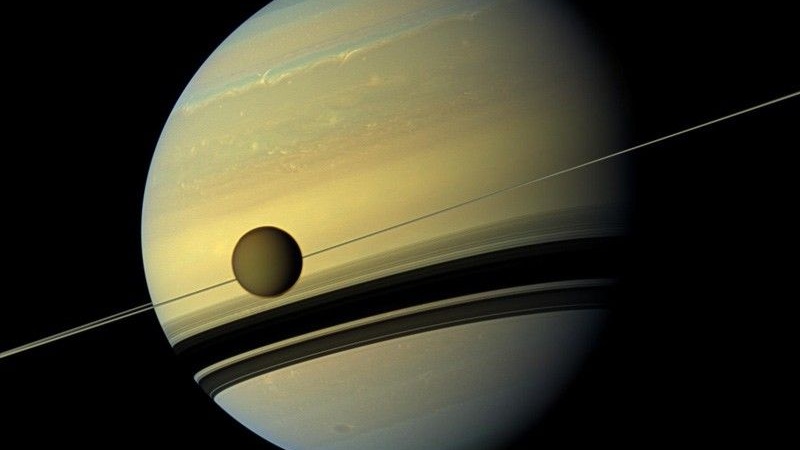Elon Musk Floats 'Nuke Mars' Idea Again (He Has T-Shirts)

Breaking space news, the latest updates on rocket launches, skywatching events and more!
You are now subscribed
Your newsletter sign-up was successful
Want to add more newsletters?

Delivered daily
Daily Newsletter
Breaking space news, the latest updates on rocket launches, skywatching events and more!

Once a month
Watch This Space
Sign up to our monthly entertainment newsletter to keep up with all our coverage of the latest sci-fi and space movies, tv shows, games and books.

Once a week
Night Sky This Week
Discover this week's must-see night sky events, moon phases, and stunning astrophotos. Sign up for our skywatching newsletter and explore the universe with us!

Twice a month
Strange New Words
Space.com's Sci-Fi Reader's Club. Read a sci-fi short story every month and join a virtual community of fellow science fiction fans!
Nuking Mars is still on Elon Musk's wish list, it would seem.
Four years ago, the SpaceX founder and CEO went on "The Late Show With Stephen Colbert" and discussed a strategy for making the Red Planet more livable: detonating nuclear bombs over its poles. The explosions would vaporize a fair chunk of Mars' ice caps, liberating enough water vapor and carbon dioxide — both potent greenhouse gases — to warm up the planet substantially, the idea goes.
This terraforming concept is apparently still bouncing around in Musk's head, because on Thursday (Aug. 15), he tweeted, seemingly unprompted, "Nuke Mars!" A few hours later, he followed up with another tweet: "T-shirt soon."
Related: Make Mars Livable with Asteroids: A Terraforming Plan
Infographic: How Humanity Could Terraform Small Planets
Nuke Mars!August 16, 2019
pic.twitter.com/NLzW87AZC0August 17, 2019
If Musk is serious about nuking the Red Planet — and it's possible that he's not — he'll have to overcome significant skepticism. For starters, many scientists and exploration advocates have concerns about any terraforming effort: Do we have the right to fundamentally transform another world — especially one that might host its own uniquely adapted life even today — for our own purposes?
In addition, the strategy might not even work. A 2018 study published in the prestigious journal Nature Astronomy concluded that Mars doesn't harbor enough CO2 today to achieve significant warming even if all the stuff were liberated into the atmosphere. "As a result, we conclude that terraforming Mars is not possible using present-day technology," the researchers wrote.
(The study team also explained why it did not consider water as a warming agent. "Previous models of atmospheric warming have demonstrated that water cannot provide significant warming by itself; temperatures do not allow enough water to persist as vapor without first having significant warming by CO2," the team members wrote.)
Breaking space news, the latest updates on rocket launches, skywatching events and more!
But the nuke concept could be worse than ineffectual, some scientists have said. Namely, it could backfire, ushering in a "phenomenon known as 'nuclear winter' (akin to the asteroid impact that killed off the dinosaurs), wherein you generate so much dust and particles that they literally block out a significant portion of the incoming sunlight, cooling down the planet," climate scientist Michael Mann of Penn State University told U.S. News and World Report via email in 2015.
Transforming frigid, dry and radiation-blasted Mars into a more clement world aligns with Musk's long-term goals. He wants to help humanity colonize the Red Planet, and he's building a spaceflight system to help make it happen — a 100-passenger spaceship called Starship and a huge rocket known as Super Heavy. The reusable duo could start launching satellites as early as 2021 and people by 2023, SpaceX representatives have said.
- Elon Musk: Private Space Entrepreneur
- Gallery: Starship and Super Heavy: SpaceX's Mars-Colonizing Vehicles
- SpaceX's Mars Colony Plan: How Elon Musk Plans to Build a Million-Person Martian City
Mike Wall's book about the search for alien life, "Out There" (Grand Central Publishing, 2018; illustrated by Karl Tate), is out now. Follow him on Twitter @michaeldwall. Follow us on Twitter @Spacedotcom or Facebook.

Michael Wall is a Senior Space Writer with Space.com and joined the team in 2010. He primarily covers exoplanets, spaceflight and military space, but has been known to dabble in the space art beat. His book about the search for alien life, "Out There," was published on Nov. 13, 2018. Before becoming a science writer, Michael worked as a herpetologist and wildlife biologist. He has a Ph.D. in evolutionary biology from the University of Sydney, Australia, a bachelor's degree from the University of Arizona, and a graduate certificate in science writing from the University of California, Santa Cruz. To find out what his latest project is, you can follow Michael on Twitter.
